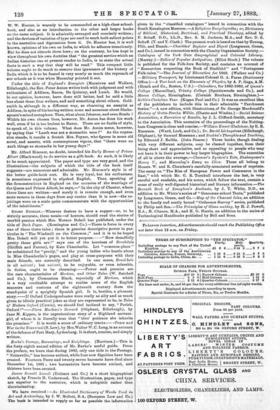Snort? STOEIES. — Whoever desires to have a supper—or, to be strictly
accurate, three meals—of horrors, should read the stories of morbid passion which Mrs. Horace Dobell has published, under the title of Dark Pages. (Remington and Co.)—There is force in every one of these three tales ; there is genuine descriptive power in par- ticular in "The Windmill on the Common ;" and it is to be hoped Mrs. Dobell will yet put it to better purpose.—" How dreadfully pretty these girls are !" says one of the heroines of Brookdale (Griffith and Ferran), by Kate Chamberlin. Let " common-place " be substituted for "pretty," and the young ladies who bustle about in Miss Chamberlin's pages, and play at cross-purposes with their male friends, are correctly described. In one sense, Brook iale is all naiveté; but naivete, to be enjoyable, or even tolerable, in fiction, ought to be charming.—Power and promise are the rare characteristics of Mericas, and Other Tales (W. Satchell and Co.), by Clementine Black, especially of Mericas, which is a very creditable attempt to realise some of the English manners and customs of the eighteenth century from the
stand-point of a sprightly Spanish girl. It is, besides, a pleasant story.—If Oxford Undergraduates were really as silly and as much
given to idiotic practical jokes as they are represented to be, in Tales of Modern Oxford (Unwin), we should feel inclined to say, "Perish, Oxford !"—Flora Maclean's Reward (Oliphant, Edinburgh), by
Jane M. Kippen, is the unpretentious story of a Highland servant.
girl, of whom it is literally true that " thro' patience she inherits the promises." It is worth a score of ordinary tracts.— -Peace and War in the Transvaal (S. Low), by Mrs.Walter W. C. Long, is an account of the defence of Fort Mary, Lydenburg. It is short, concise, and simply written.






































 Previous page
Previous page